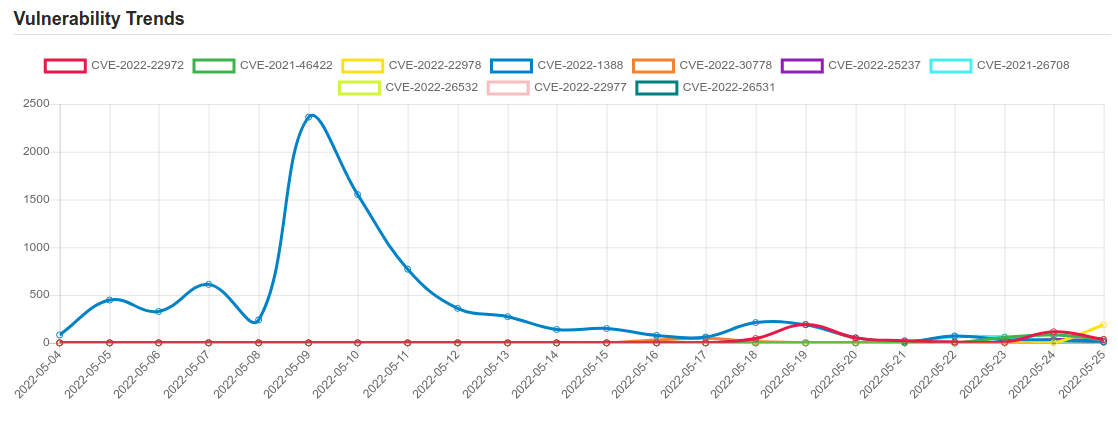Daily Vulnerability Trends: Thu May 26 2022

| CVE NAME | CVE Description |
| CVE-2022-22787 | The Zoom Client for Meetings (for Android, iOS, Linux, macOS, and Windows) before version 5.10.0 fails to properly validate the hostname during a server switch request. This issue could be used in a more sophisticated attack to trick an unsuspecting users client to connect to a malicious server when attempting to use Zoom services. |
| CVE-2022-22954 | VMware Workspace ONE Access and Identity Manager contain a remote code execution vulnerability due to server-side template injection. A malicious actor with network access can trigger a server-side template injection that may result in remote code execution. |
| CVE-2022-1529 | No description provided |
| CVE-2022-22784 | The Zoom Client for Meetings (for Android, iOS, Linux, MacOS, and Windows) before version 5.10.0 failed to properly parse XML stanzas in XMPP messages. This can allow a malicious user to break out of the current XMPP message context and create a new message context to have the receiving users client perform a variety of actions.This issue could be used in a more sophisticated attack to forge XMPP messages from the server. |
| CVE-2022-1802 | No description provided |
| CVE-2022-26809 | Remote Procedure Call Runtime Remote Code Execution Vulnerability. This CVE ID is unique from CVE-2022-24492, CVE-2022-24528. |
| CVE-2022-1729 | No description provided |
| CVE-2022-27254 | The remote keyless system on Honda Civic 2018 vehicles sends the same RF signal for each door-open request, which allows for a replay attack, a related issue to CVE-2019-20626. |
| CVE-2021-46422 | Telesquare SDT-CW3B1 1.1.0 is affected by an OS command injection vulnerability that allows a remote attacker to execute OS commands without any authentication. |
| CVE-2022-1388 | On F5 BIG-IP 16.1.x versions prior to 16.1.2.2, 15.1.x versions prior to 15.1.5.1, 14.1.x versions prior to 14.1.4.6, 13.1.x versions prior to 13.1.5, and all 12.1.x and 11.6.x versions, undisclosed requests may bypass iControl REST authentication. Note: Software versions which have reached End of Technical Support (EoTS) are not evaluated |
| CVE-2022-30778 | Laravel 9.1.8, when processing attacker-controlled data for deserialization, allows Remote Code Execution via an unserialize pop chain in __destruct in Illuminate\Broadcasting\PendingBroadcast.php and dispatch($command) in Illuminate\Bus\QueueingDispatcher.php. |
| CVE-2022-25237 | No description provided |
| CVE-2021-26708 | A local privilege escalation was discovered in the Linux kernel before 5.10.13. Multiple race conditions in the AF_VSOCK implementation are caused by wrong locking in net/vmw_vsock/af_vsock.c. The race conditions were implicitly introduced in the commits that added VSOCK multi-transport support. |
| CVE-2022-26532 | A argument injection vulnerability in the ‘packet-trace’ CLI command of Zyxel USG/ZyWALL series firmware versions 4.09 through 4.71, USG FLEX series firmware versions 4.50 through 5.21, ATP series firmware versions 4.32 through 5.21, VPN series firmware versions 4.30 through 5.21, NSG series firmware versions 1.00 through 1.33 Patch 4, NXC2500 firmware version 6.10(AAIG.3) and earlier versions, NAP203 firmware version 6.25(ABFA.7) and earlier versions, NWA50AX firmware version 6.25(ABYW.5) and earlier versions, WAC500 firmware version 6.30(ABVS.2) and earlier versions, and WAX510D firmware version 6.30(ABTF.2) and earlier versions, that could allow a local authenticated attacker to execute arbitrary OS commands by including crafted arguments to the CLI command. |
| CVE-2022-22977 | VMware Tools for Windows(12.0.0, 11.x.y and 10.x.y) contains an XML External Entity (XXE) vulnerability. A malicious actor with non-administrative local user privileges in the Windows guest OS, where VMware Tools is installed, may exploit this issue leading to a denial-of-service condition or unintended information disclosure. |
| CVE-2022-26531 | Multiple improper input validation flaws were identified in some CLI commands of Zyxel USG/ZyWALL series firmware versions 4.09 through 4.71, USG FLEX series firmware versions 4.50 through 5.21, ATP series firmware versions 4.32 through 5.21, VPN series firmware versions 4.30 through 5.21, NSG series firmware versions 1.00 through 1.33 Patch 4, NXC2500 firmware version 6.10(AAIG.3) and earlier versions, NAP203 firmware version 6.25(ABFA.7) and earlier versions, NWA50AX firmware version 6.25(ABYW.5) and earlier versions, WAC500 firmware version 6.30(ABVS.2) and earlier versions, and WAX510D firmware version 6.30(ABTF.2) and earlier versions, that could allow a local authenticated attacker to cause a buffer overflow or a system crash via a crafted payload. |
| CVE-2022-30781 | Gitea before 1.16.7 does not escape git fetch remote. |
| CVE-2017-11882 | Microsoft Office 2007 Service Pack 3, Microsoft Office 2010 Service Pack 2, Microsoft Office 2013 Service Pack 1, and Microsoft Office 2016 allow an attacker to run arbitrary code in the context of the current user by failing to properly handle objects in memory, aka “Microsoft Office Memory Corruption Vulnerability”. This CVE ID is unique from CVE-2017-11884. |
| CVE-2022-22972 | VMware Workspace ONE Access, VMware Identity Manager, and VMware vRealize Automation security bypass | CVE-2022-22972 |
| CVE-2022-22978 | Spring Security security bypass | CVE-2022-22978 |
If you like the site, please consider joining the telegram channel and supporting us on Patreon using the button below.


